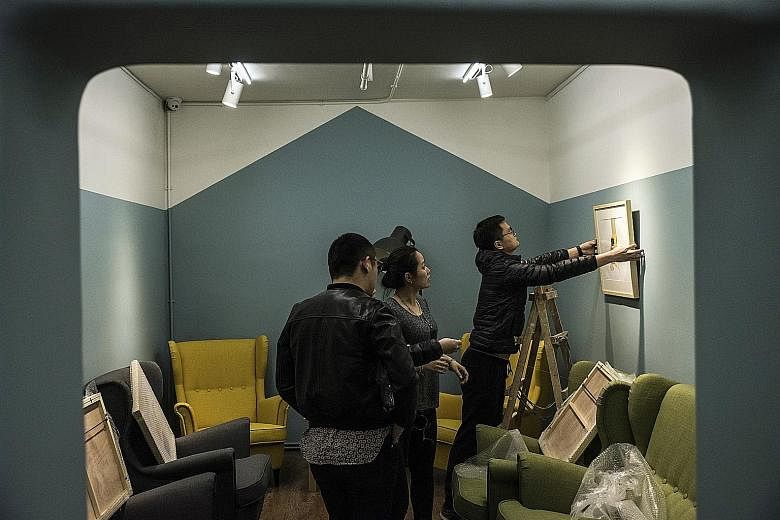BEIJING • The Digua Shequ community centre in Beijing is painted in cheery pastel tones and festooned with colourful paper dragons hung from the ceiling.
Inside are a hair salon, a cafe and a gym - normal shops for a typical neighbourhood - except that they are underground.
All the storefronts are two floors below the street, built inside a former bomb shelter designed to withstand a nuclear war.
Digua Shequ, a start-up that turns unused basements into community centres and whose name is Chinese for Sweet Potato Community, has been renovating the shelter in north-east Beijing for the past year. It wants to reimagine the future of the city's underground spaces, once largely ignored but now contested by a combination of government, commercial and artistic interests.
The centre's founder Zhou Zishu, a former designer at the National Museum of China, was inspired by the debate over what to do with Beijing's bomb shelters, which house well over 100,000 people.
"Our work is not just about renovating basement spaces and making them look better," he said. "It's actually about improving the lives of residents and creating a new sense of community. We want to take these private spaces and make them public again."
But not everyone agrees with Digua Shequ's vision. The uncertain fate of the shelters, as well as the rules for their use, has drawn attention from several competing stakeholders.
Beijing's more than 10,000 concrete bunkers, built more than 40 years ago, were a crucial part of the late Chinese leader Mao Zedong's Cold War defence strategy.
Some of the bunkers, which were handed over to neighbourhood authorities in the 1980s when the country's economy was liberalised, were turned into shops or offices. Most were converted into living spaces and rented out to migrant workers or residents trying to duck Beijing's soaring real estate prices.
The news media called these subterranean residents the rat tribe and the shelters gained a reputation for neglect.
In 2010, Beijing announced that the residential use of underground spaces would be illegal by the end of 2012. The deadline has been extended to next year.
One pressing question facing the city is what to do with the people who still live in the bunkers. Estimates of their numbers range from 150,000 to one million.
Nearly every apartment building in the Digua Shequ centre's neighbourhood has a former shelter or a basement. Most of the residential units in them are rented out for 500 to 900 yuan (S$105 to S$190) a month - about one-third of what it would cost to live aboveground.
"Workers' wages aren't rising as fast as the cost of living," said Mr Xu Tong, who both rents out and lives in an underground space in eastern Beijing. "If you get rid of these basement units, where will the migrants live?"
Government data shows that migrant workers' wages increased about 14 per cent in 2014 from a year earlier, compared with a nearly 22 per cent increase in their cost of living.
Mr Xu's lease illustrates the uncertainty about how serious the government's ban on underground dwellings is: Although the new rule takes effect next year, his contract does not expire until 2019.
So far, Digua Shequ's work remains an exceptional case for having legally repurposed the spaces under the new rules.
Currently, the Civil Air Defense Department of Beijing grants one- year leases on former bomb shelters to individuals and companies.
The order to end residential use means that some stand to lose a source of revenue, as few local officials and landlords are willing to spend to turn the units into commercial spaces. As a result, many shelters and basements occupied before the ban was announced are still being quietly rented out as housing.
Subletting underground spaces can be lucrative. A lease for an entire basement or shelter typically costs about 150,000 yuan a year, but subdividing the space can generate far more income.
The shelter that Digua Shequ took over once housed more than 100 residents who together paid nearly 600,000 yuan a year, said Mr Zhou.
"A lot of landlords have spent money renovating the spaces they lease, so they don't want to stop renting out basements," said Mr Guo Chengbao, a security guard who was once a basement landlord. He lives in an underground unit above the Digua Shequ centre.
Private investors have also been eyeing underground spaces.
Renovating the basement that now houses the Digua Shequ centre cost nearly 3 million yuan, most of which was covered by Mr Feng Lun, founder of Vantone Holdings and its real estate subsidiary, Vantone Real Estate.
In an interview with Mr Zhou for the online series Wind Horse Cow, which Mr Feng produces, the Vantone founder explained his interest in the project. "We've constructed a lot of buildings, but there's no one today who is operating underground spaces like this. If other real estate developers came and saw your space, they might invite you to develop their underground spaces during construction."
Mr Zhou said underground dwellings might never be eliminated because of the different interests at play, but that he hoped the Digua Shequ model would be replicated in other neighbourhoods. He saw it as a chance to transcend differences in social class and origin.
Mr Guo, the security guard, likes what it has done so far. After work, he sometimes eats dinner in the community space.
"I've lived in Beijing for 14 years. Before, I didn't know any of the people who lived upstairs," he said, laughing. "Now, we're all familiar with each other."
NEW YORK TIMES


